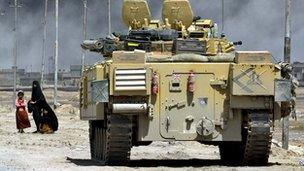Tony Blair: Life in Iraq 10 years on not as I hoped
- Published
Mr Blair says he has given up trying to persuade people that invading Iraq was the right choice
Former UK Prime Minister Tony Blair has told BBC Newsnight daily life in Iraq today is not what he hoped it would be when he opted to invade 10 years ago.
He said there had been "significant improvements" but that "it is not nearly what it should be," pointing in particular to on-going terror attacks.
However, he insisted that the situation under Saddam Hussein was far worse.
And he said although the world was not safer than 10 years ago, it was safer than it would be if he had remained.
Mr Blair was speaking exclusively to Newsnight's Kirsty Wark as part of a special programme marking the upcoming 10th anniversary of the US-led invasion of Iraq, which will be broadcast later on Tuesday.
He said that the price paid in the lives of British troops and civilian casualties had been high, but he pointed to the numbers of people who had suffered under Saddam Hussein and the significant numbers killed under his regime in Kurdish areas and during the Iran-Iraq war.
Mr Blair said that he thinks about those who died and the consequences for their families, but added that "in the end you are elected as prime minister to make these decisions".
Hans Blix: "The starting of the Iraq war was a tragic and terrible mistake"
"The question is, supposing I had taken the opposite decision? Sometimes what happens in politics, and unfortunately these things get mixed up with allegations of deceit and lying and so on, in the end sometimes you come to a decision where whichever choice you take the consequences are difficult and the choice is ugly. This was one such case.
"If we hadn't removed Saddam from power just think, for example, what would be happening if these Arab revolutions were continuing now and Saddam, who's probably 20 times as bad as Assad in Syria, was trying to suppress an uprising in Iraq? Think of the consequences of leaving that regime in power.
"So when you say 'do you think of the loss of life since 2003', of course I do, you would have to be inhumane not to, but think of what would have happened if he had been left there."
Future threats
Mr Blair admitted that the issue of Iraq remain extremely divisive:

The US-led invasion of Iraq began in the early hours of 20 March 2003
"I have long since given up trying to persuade people that it was the right decision," he said.
But he said that understanding the full complexities of the decision is vital as the world faces similar problems over Syria and Iran:
"In a sense what I try to persuade people of now is to understand how complex and difficult a decision it was because I think if we don't understand we won't take the right decision about what I think will be a series of these types of problems that will arise over the next few years.
"You've got one in Syria right now, you've got one in Iran to come, the issue is how do you make the world a safer place?"
Britain's role
Mr Blair insisted that there was a long fight ahead and that Britain could not avoid being involved:
"We are in the middle of this struggle, it is going to take a generation, it is going to be very arduous and difficult. But I think we are making a mistake, a profound error if we think we can stay out of that struggle because we are going to be affected by it whether we like it or not."
The invasion of Iraq led by US troops, in coalition with the UK and other nations, began on 20 March 2003.
The UK lost 179 servicemen and women, of which 136 were killed in action, before the last British troops were withdrawn in April 2009.
The exact number of Iraqis killed in the invasion and ensuing sectarian violence is unknown however, conservative estimates put the figure at around 100,000 dead.